When looking for a therapist, choosing someone you feel comfortable with and who understands your culture is a good idea.
Black marriage counseling may specifically address cultural issues and the impact of societal factors on relationships. This can include discussions about systemic challenges, racial dynamics, and unique stressors that African-American couples may face.
In this guide, we’ve looked at the nine best places for African-American couples to find black marriage counseling.
Want to skip right to the suggestions for black marriage counseling? Here are our 9 recommended therapy solutions:
- ReGain
- Ritual
- Online-therapy.com
- Calmerry
- Inclusivetherapists.com
- African American Marriage Counseling
- Onipa Psychological and Consulting
- Bridges To Wellness
- The Hardy Clinic Wellness Center
Black marriage counseling services
Below, we’ve looked at nine of the best African-American marriage counseling services for black couples.
| Provider | Good for | Location | Pricing |
|---|---|---|---|
| ReGain | Quick match with the right African-American couples therapist for you | Online therapy | $65 to $90 per week (billed every 4 weeks) |
| Ritual | Couples guidance through proven interventions | Online service | $100 to $260 per month |
| Online-therapy.com | Finding licensed and experienced therapists with a Cognitive Behavioral Therapy (CBT) approach | Online therapy | $40/week to $88/week (including our 20% discount first month) |
| Calmerry | Individual relationship counseling | Online therapy | $49.50 to $73.75 per week (billed monthly) |
| Inclusivetherapists.com | Find and contact the right inclusive therapist for you and your partner | Online and in-person therapy in the U.S., Canada, Hong Kong, Portugal, Taiwan, and Thailand | Varies depending on the counselor fee |
| African American Marriage Counseling | Married, unmarried, and pre-marital couples | In-person or online therapy for Washington, D.C., Virginia and Maryland residents | $97/month to $250/session according to the plan you choose |
| Onipa Psychological and Consulting | African-centered cultural consulting sessions | Online therapy worldwide and in-person therapy in Raleigh, NC | $250 per session |
| Bridges To Wellness | Improving communication in your relationship | Online and in-person therapy in Chicago, IL | Varies |
| The Hardy Clinic Wellness Center | Finding a female therapist | Online therapy for Georgia residents | Starting at $145 per sesion |
1. ReGain
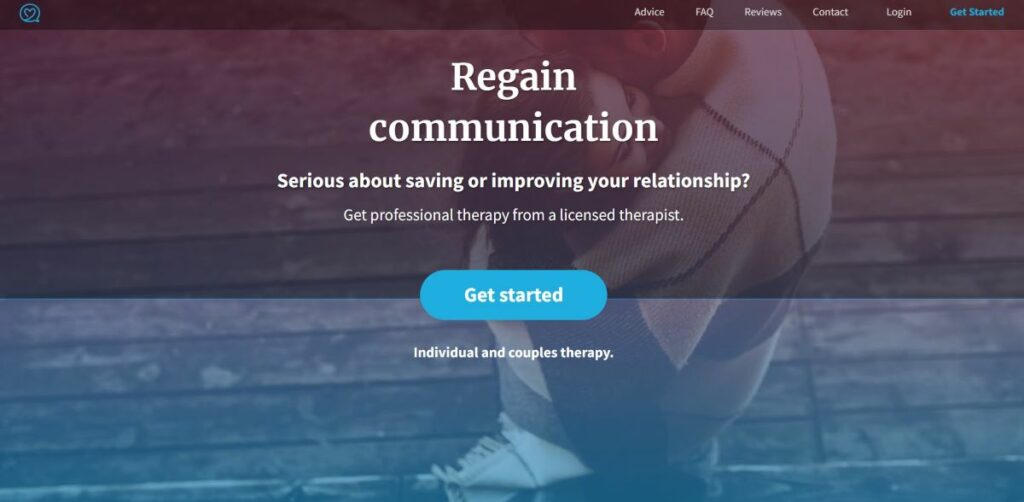
Tailored for individuals and couples navigating relationship or marital issues – ReGain is your online relationship therapy solution. Starting at $65/week, you can schedule one weekly live session and message your therapist anytime. Start your path to healthier connections with ReGain – fill out their online assessment form.
- Good for: Quick match with the right African-American couples therapist for you.
- Location: Online therapy.
- Pricing: $65 to $90 per week (billed every 4 weeks).
- Features: iOS and Android app available, message your therapist anytime, live sessions are scheduled weekly and done via live chat, phone, or video call.
ReGain is a service that connects you with a relationship counselor over the Internet, helping African-American couples overcome various marriage issues. Finding an African-American marriage counselor is easy with ReGain. After making an account, you fill out a short questionnaire where you specify your need for a counselor from your culture. ReGain will match you with a black marriage counselor who meets your needs, so you can quickly start treatment.
Inviting your husband or wife to join the therapy sessions is also quite simple. You simply send them an invite, which allows your partner access to the therapy room from their own device. From this moment on, both partners can read all text messages. You can always ask for individual sessions with your relationship counselor if needed.
2. Ritual
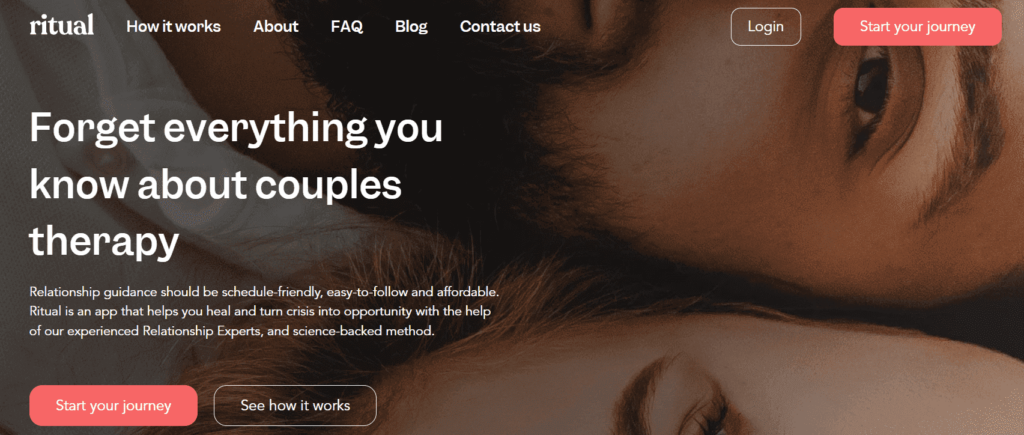
Ritual assists you in healing and transforming relationship issues into opportunities with the aid of their experienced Relationship Experts and science-backed methods. Complete the Ritual assessment to begin rekindling your relationship with 1:1 sessions with experienced professionals, personalized in-app content, guided reflections, and activities between sessions.
- Good for: Couples guidance through proven interventions.
- Location: Online service.
- Pricing: $100 to $260 per month
- Features: 1-1 sessions with relationship experts, online activities and personalized skill-building content, option to join together as a couple or on your own.
Ritual helps you navigate love after becoming a family. Put your family first by making sure you stick together and harness expert intervention to strengthen your relationship. This service offers 1:1 video sessions, tools, exercises, and exclusive video content to help your relationship grow.
You can join Ritual together as a couple or on your own, and by the way – you can always start one way and change as you go. Additionally, if you don’t feel comfortable for any reason with your relationship expert you can switch anytime.
3. Online-therapy.com
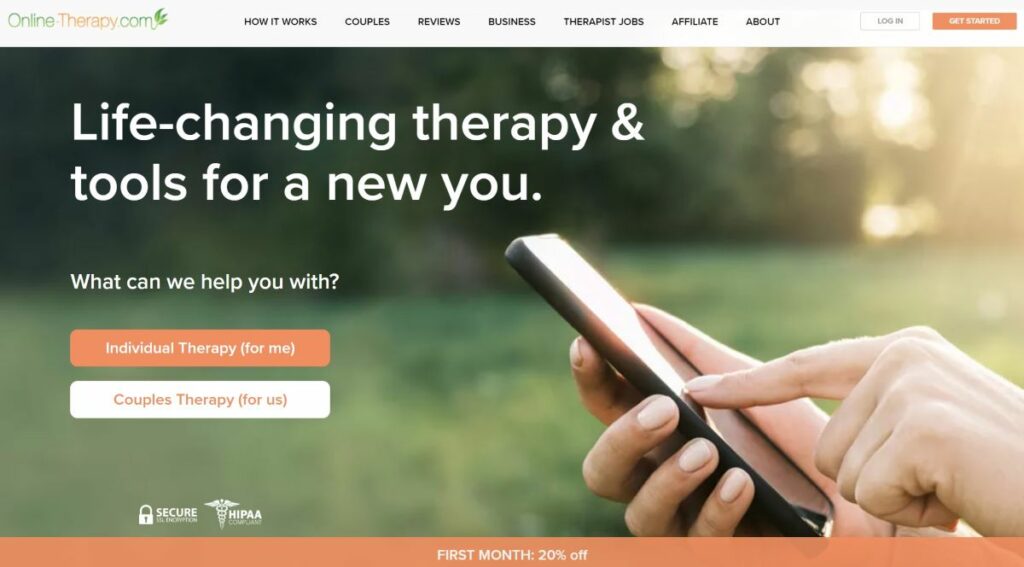
Discover transformative online therapy with Online-therapy.com. Through cognitive behavioral therapy (CBT), Online-therapy.com offers individual and couples support starting at $45/week. Engage in sessions via video, voice, or text for maximum flexibility. Fill out their online questionnaire to get started.
- Good for: Finding licensed and experienced therapists with a Cognitive Behavioral Therapy (CBT) approach.
- Location: Online therapy.
- Pricing: $40/week to $88/week (including our 20% discount first month).
- Features: Unlimited messaging with your therapist, including a daily journal and activity plan, yoga and meditation videos, and tests to see your progress.
Online-therapy.com features a varied group of licensed and well-trained therapists, each bringing their distinctive expertise and therapeutic approaches, including couples therapy. The platform maintains a standard where all therapists hold a full license, boast a minimum of 2000 hours of clinical experience, and showcase proficiency in Cognitive Behavioral Therapy (CBT) methods.
Read our Online-therapy.com review here.
4. Calmerry
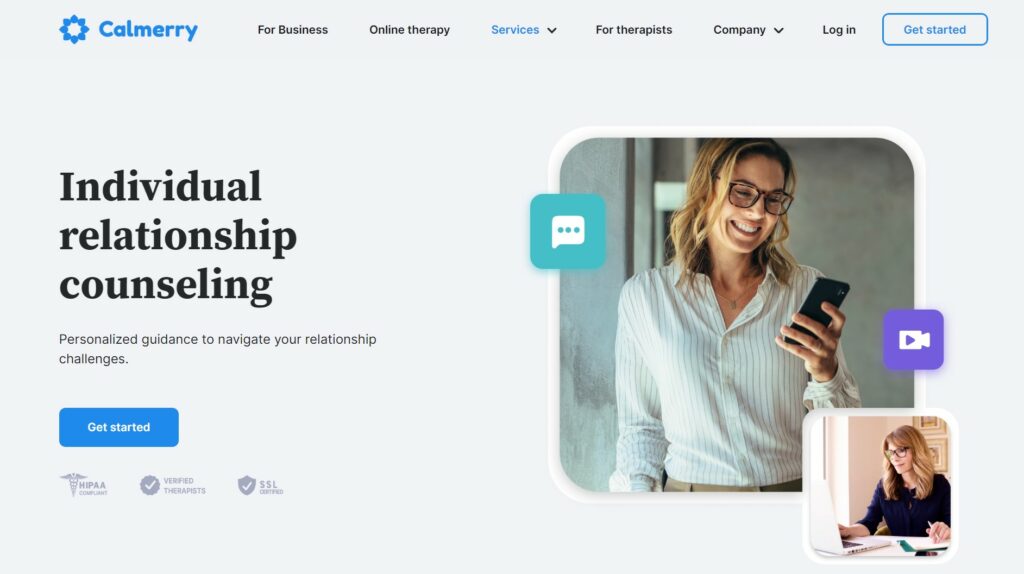
Embark on a journey of mental wellness with Calmerry. With diverse subscription options, starting at just $50, Calmerry makes prioritizing your mental health simple and accessible. You can message your therapist any day or schedule a live therapy session from the comfort of your home from any device.
- Good for: Individual relationship counseling.
- Location: Online therapy.
- Pricing: $49.50 to $73.75 per week (billed monthly).
- Features: Message to your counselor anytime, text therapy and video therapy according to the plan you choose, free counselor switching.
Another site available for relationship and marriage counseling is Calmerry. All the therapists and counselors on Calmerry are licensed professionals, and most of them specialize in family and marriage therapy. On the platform, you can find licensed marriage and family therapists, licensed professional counselors, and licensed mental health counselors, a number of whom are African-American.
Joining Calmerry is quite straightforward. When you visit their website, you can create an account and fill out a short questionnaire, designed to assess your relationship or mental health issues. During this process, you can specify that you’re looking for an African-American relationship counselor. The Calmerry team will then match you with the right therapist based on your answers, and you can expect them to reach out within one business day.
5. Inclusivetherapists.com

- Good for: Finding and contacting the right inclusive therapist for you and your partner.
- Location: Online and in-person therapy in the U.S., Canada, Hong Kong, Portugal, Taiwan, and Thailand.
- Pricing: Varies depending on the counselor fee.
- Features: Online directory, get matched with the right therapist for you, culturally responsive, LGBTQ+ affirming, social justice-oriented therapists.
Inclusivetherapists.com is a website that provides therapy resources, especially for people of color. They are focused on providing a safe space for black/African American people to find an appropriate therapist. This website provides a directory of relationship therapists and licensed marriage and family therapists that can help you and your African-American partner heal and improve your relationship.
Unlike with an online provider, you’re not limited to the therapist(s) that the online service matches you with – with this website, you can make a direct appointment with a counselor. Inclusivetherapists.com provides each psychologist’s contact details – it’s basically an open online directory for people of color seeking a psychologist.
6. African American Marriage Counseling
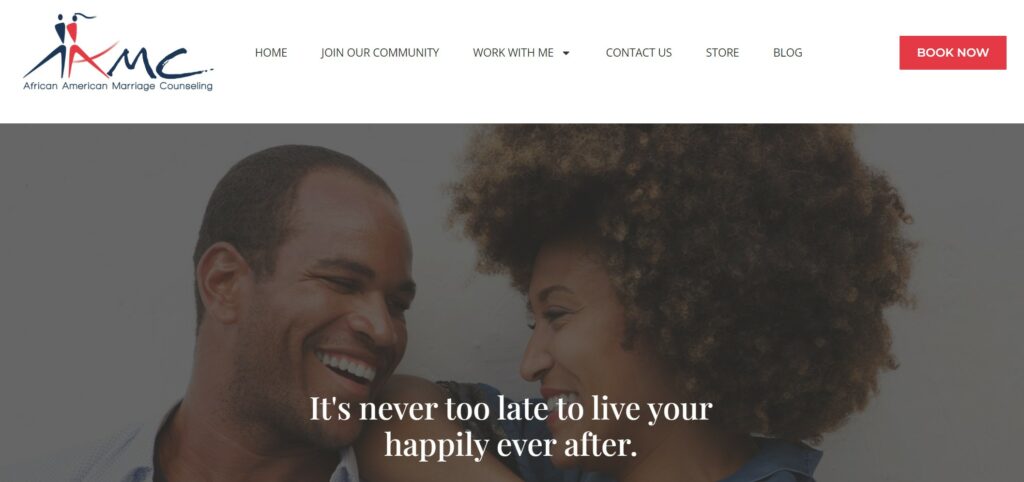
- Good for: Married, unmarried, and pre-marital couples.
- Location: In-person or online therapy for Washington, D.C., Virginia and Maryland residents.
- Pricing: $97/month to $250/session according to the plan you choose.
- Features: Free 5-day challenge, membership plan available, also specialized in African, Eritrean, Ethiopian, and Caribbean couples.
African American Marriage Counseling is directed by Dr. Shane Perrault, Ph.D. Here you can find two options to work with or without your partner. The first one is the “Happily Ever After Marriages membership” which gives you access to a masterclass vault, monthly expert training, interactive online community, and more. The second option is the “1-1 marriage + counseling services” which gives you access to virtual or in-person marriage counseling, VIP access, coaching sessions and packages, and more.
7. Onipa Psychological and Consulting
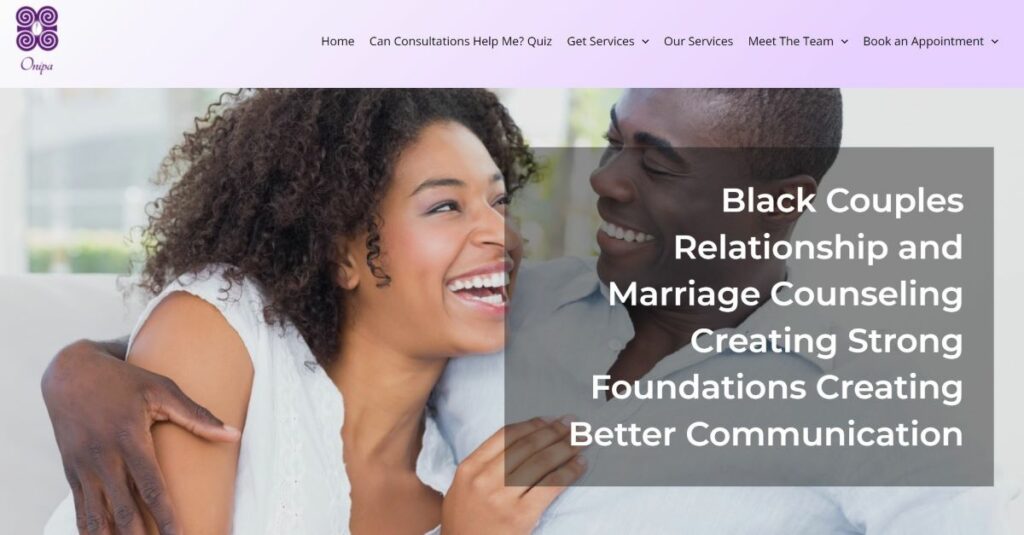
- Good for: African-centered cultural consulting sessions.
- Location: Online therapy worldwide and in-person therapy in Raleigh, NC.
- Pricing: $250 per session.
- Features: Online guided meditation, HIPAA-compliant teletherapy phone & video call, full sensory experience.
Onipa Psychological and Consulting offers a holistic African-centered cultural approach to couples looking for black couples relationships and marriage counseling. You can set an appointment at Onipa on their website or via phone. Some of the issues you and your partner can work there include:
- Communication challenges
- Loss of emotional or sexual spark
- Infidelity
- Pre-marital counseling
- Maintaining civility in divorce
8. Bridges To Wellness
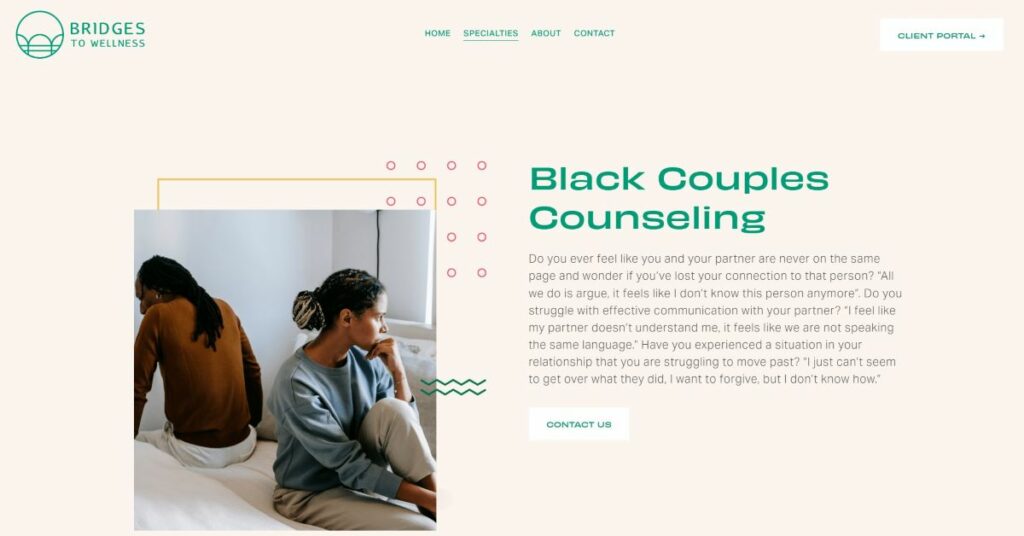
- Good for: Improving communication in your relationship.
- Location: Online and in-person therapy in Chicago, IL.
- Pricing: Varies.
- Features: Emotion-Focused Therapy (EFT) techniques, in-person therapy in Chicago, IL, contact them by phone, email, or directly in their office.
Bridges to Wellness uses Emotion-Focused Therapy (EFT) techniques to enhance the connection between you and your partner. Also helps you to understand your and your partner’s feelings in order to communicate them effectively and reduce misunderstandings and conflicts. Here you can choose between in-person and online therapy, according to your preferences and needs.
9. The Hardy Clinic Wellness Center

- Good for: Finding a female therapist.
- Location: Online therapy for Georgia residents.
- Pricing: Starting at $145 per session.
- Features: Accepts insurance, sliding scale services are available, premarital counseling, choose your preferred therapist.
The Hardy Clinic Wellness Center offers a range of services, including black marriage counseling. The center has an extensive range of female therapists who are accredited and licensed in the state of Georgia. You can book an appointment by filling up an intake form which includes your basic information, type of therapy, insurance information, medical and mental health history, and your preferred therapist.
How can African American couples counseling help my relationship?
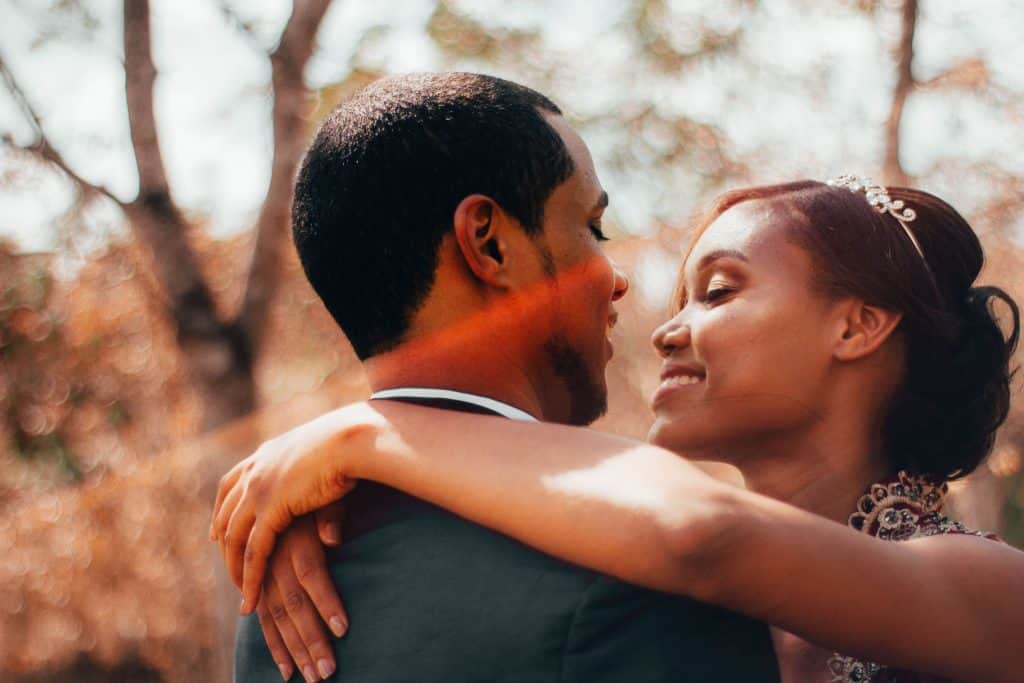
Marriage counseling or couples therapy is helpful for those who want to strengthen or rebuild their relationship. It can help you to overcome a critical issue that has recently arisen, or it may be that the strength of your bond has declined over time and you want to fix this.
Some people also go to relationship counseling individually, either before they get married or to figure out if they really want to divorce their partner. This does not necessarily require seeing a marriage counselor specifically.
Common issues that marriage counseling helps to address include:
- Rebuilding trust after infidelity
- Attachment issues
- Communication issues (arguing, for example)
- Difficulties with sex/intimacy
- Consequences of infertility or child loss
- Conflicts regarding child rearing, paternal/maternal involvement or blended families
- Substance abuse
- Anger management issues
- Domestic violence
These issues may trigger your anxiety and can be quite challenging to talk about. Marriage counseling can help by providing you with the tools to manage the situation so that your relationship does not need to end up in divorce.
If you or your partner makes you feel unsafe or if you are in a crisis, you should contact the emergency services immediately. When your situation significantly impacts your mental health or physical well-being, it’s often best to make an appointment with a provider in person.
You can also contact the National Domestic Violence Hotline on 800.799.7233 for advice if your partner is abusive towards you.
What happens during marriage counseling?
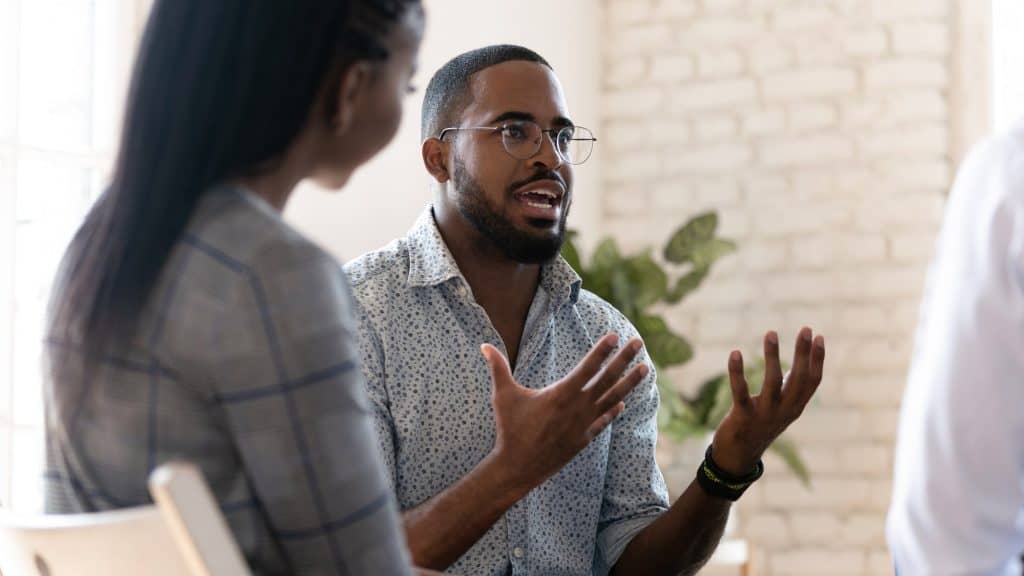
Visiting a counselor for the first time, especially a marriage counselor, may seem intimidating. Here’s what the process involves to help put your mind at ease.
First session
At the start of your first session, your therapist will likely review the basics and prepare you and your partner for future counseling sessions. They will ask for your emergency contact information and inform you how their counseling will work.
Together with the psychologist, you and your partner will outline the basics of your problems. This is also an intake interview and will occur during the first session.
Your counselor might ask:
- What you/your partner are experiencing
- How long this has been going on
- How you have tried to manage it
- What your goals or expectations are from marriage counseling
Your African-American therapist might also ask if you and/or your partner have been to therapy. The first session is a way for the counselor to gather information and for you to learn more about what therapy will involve.
Further sessions
The following sessions help you and your partner work on your issues together. In general, couples counselors expect both partners to participate in the sessions.
If you or your partner have any other personal mental health-related issues, you may be referred to an individual therapist to work on this problem in private, or depending on the context, your counselor might invite you to a private session. When using online therapy services, you can normally message your counselor privately if you want to talk.
A good couple counselor or therapist will assess your behavioral and communication patterns and help you with some tools to overcome your relationship problems. Couples therapy is an interactive process – a therapist might give you and your partner homework to help you work on the topics you discuss during the session.
Choosing a neutral marriage counselor
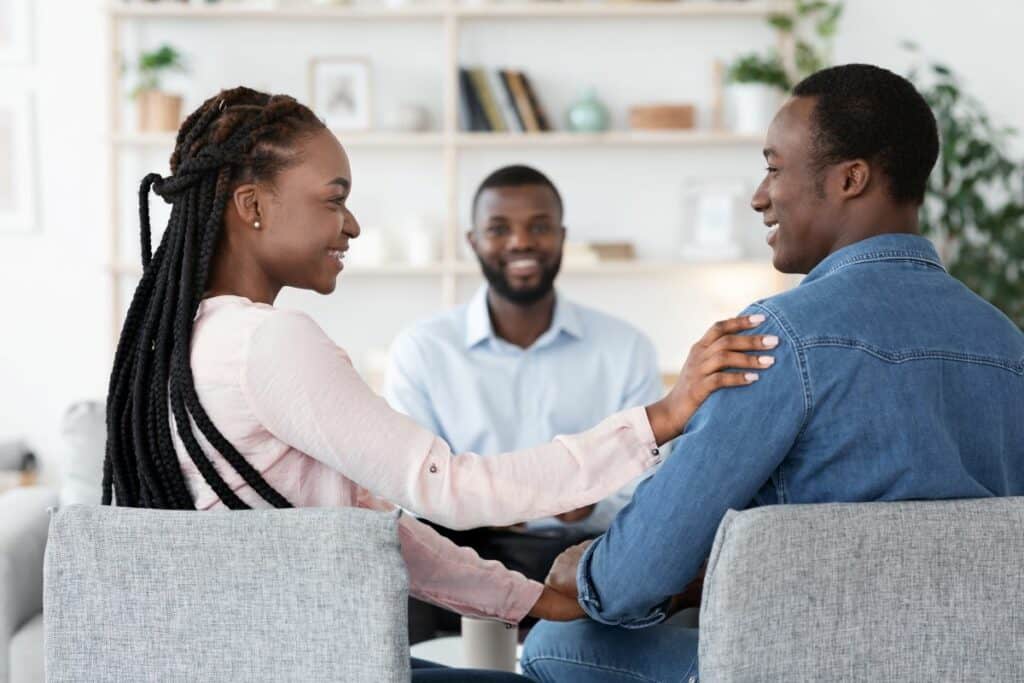
It’s perfectly normal to worry about your therapist’s potential biases. There should be no bias from your counselor against black or being part of the LGBT community, as a few examples.
Healthcare professionals study for years to ensure that they offer a neutral and objective point of view – they are trained to listen, rather than judge, no matter who their clients are.
They are not there to point fingers; however, some therapists can become biased over time. It’s a good idea to read reviews of each counselor before deciding to use them, and it’s also best to change to a different therapist if you ever feel uncomfortable.
Conclusion
There are ways to save your marriage – a first step forward is to find a black or African-American couples therapist who understands your relationship challenges. A professional therapist can provide you with tools for better communication, help to resolve conflicts, and can address intimacy issues. Couples counseling creates a comfortable space to manage your relationship problems.
If your mental health is in a place where you are having thoughts of harming yourself or others, or you are in immediate danger, you should contact the emergency services at 911. If you are a domestic violence victim but not in immediate danger, you can contact the National Domestic Violence Hotline on 800.799.7233.





